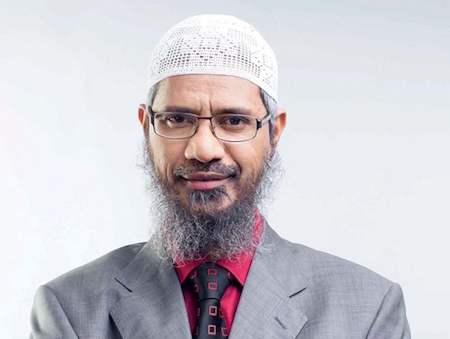By revering Zakir Naik, Malaysia is endorsing his malice
Zurairi AR, Malay Mail Online
While you might not be familiar with Zakir Naik, the Mumbai-born preacher is undoubtedly one of the most popular Muslim televangelists worldwide.
The official Facebook page of the Islamic Research Foundation president has over 12 million likes; his Twitter account has nearly 86,000 followers; while his YouTube videos regular rake up six-digit views. His Peace TV channel claims at least 50 million subscribers in 125 countries.
But for a taste of what makes Naik notorious, consider this: He has been denied entry by at least two countries, the United Kingdom and Canada.
In June 2010, Naik was denied entry by UK Home Secretary Theresa May, citing his “unacceptable behaviour”.
In the same month, he was banned by Canada after the founder of the Muslim Canadian Congress, the Pakistan-born Tarek Fatah, sent a mass email to Canadian MPs warning against Naik’s inflammatory views.
While a ban should never be the catch-all solution for offensive speech, the actions taken by the two governments demonstrated their concern about the sort of provocative remarks Naik has made ever since he started preaching in 1991.
Chief among their concerns would probably be his questionable stance on terrorism perpetuated by Islamic militants.
The most infamous was surely his support of al-Qaeda jihadists and Osama bin Laden in a lecture delivered to a crowd of thousands in 2006, calling for “every Muslim to be a terrorist”.
“If he [Osama] is terrorising the terrorist, if he’s terrorising America, the biggest terrorist, I’m with him.
“Every Muslim should be a terrorist! The thing is that if he’s terrorising the terrorist, then he’s following Islam,” Naik said in the lecture, a statement still lauded by many of his supporters.
That has not stopped Naik from claiming his comments were taken out of context. But his defence in 2008 was a mindboggling attempt to redefine the semantics of terrorism: “Every Muslim should be a terrorist. A terrorist is a person who causes terror.
“Similarly, every Muslim should be a terrorist for the antisocial elements of society, such as thieves, dacoits and rapists.”
Like many who are in denial over al-Qaeda’s role in the devastating 9/11 attacks, Naik claimed that it was “a blatant secret” that they were orchestrated by then-US president George W. Bush.
Naik also advocates death for a number of groups, like apostates who “propagate [their] new faith against Islam”, and homosexuals.
Yet, Malaysia rolls out the red carpet for Naik every single time he visits. In 2012, he gave four lectures — one of them in public institution Universiti Teknologi MARA, while another was attended by former prime minister Tun Dr Mahathir Mohamad.
In 2013, Naik was even awarded the distinguished “Tokoh Maal Hijrah” award by the Yang di-Pertuan Agong, Tuanku Abdul Halim Mu’adzam Shah.
Starting this weekend, Naik is in Terengganu on a one-week tour of the state. And it is undeniable that big money is behind it.
Naik is here at the invitation of the mentri besar himself, Datuk Seri Ahmad Razif Abd Rahman, after the two men met in South Korea last November. Subsequently, “Transformasi Terengganu Baru” (New Terengganu Transformation), the à la 1Malaysia slogan that is the brainchild of Ahmad Razif, accompanies almost all of the tour’s promotional material.
Arguably, a substantial amount of initiative must have been spent on social media, with a blitz of tweets carrying the hashtag #ZakirNaikTerengganu to build up hype — almost all with the same template of explaining “facts” about him, and extolling the qualities of “gaining knowledge” from the evangelist.
Further, several of the more influential accounts who joined the campaign are those you would have never dreamt would give a hoot about an Islamic event. The money must have been really good, then?
But it is easy to see why some are genuine fans of the charismatic orator. Wearing a suit and tie, Naik speaks impeccable English, and is generous with his smile, even when he is denigrating other religions. He memorises not only the Quran, but also the Veda and the Bible, and can cite verse after verse to explain away his half-truths and logical fallacies.
All these would be more than enough to enthral the common man used to being spoon-fed by clerics, to gloss over Naik’s many pseudoscientific assertions against Evolution, and linguistic acrobats to claim that many scientific truths were prophesied in the Quran — a practice called Bucailleism.
However, the most dangerous of Naik’s preaching is his rhetoric against followers of other faiths, even as he tries to portray himself as a comparative religion expert.
In India, Darul Uloom Deoband — the birthplace of the Deobandi reformist movement — decreed in 2012 that Naik is “unreliable”, and urged Muslims to avoid following him. In 2008, several Sunni groups in India called for his ban.
Here, in Malaysia, Hindu group Hindraf has consistently protested against Naik, this week calling him a hate-monger endangering pluralistic Malaysia.
But we are still too slow to recognise these warnings.
It could be argued that Naik’s views are the product of his Salafist beliefs, but a conversation with several local Muslims would tell you that his views are not out of the ordinary from what they have been taught since young.
Forget about our Islamic authorities’ half-hearted attempt to curb extremism; these views are fast becoming mainstream, and non-Muslims should not be surprised by this development.



